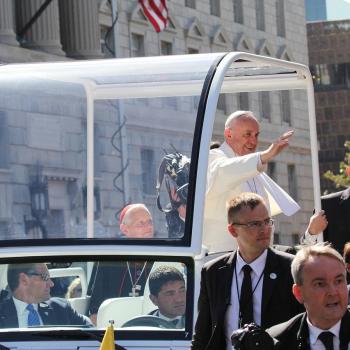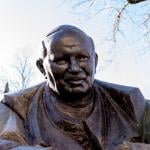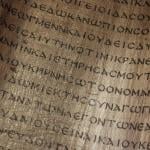HAEVEN ASKS:
I’m beginning to fast and was wondering if I should hide it from people because of the verse that says to. I don’t know if I can tell people without the intent to show off.
THE RELIGION GUY ANSWERS:
We’re heading into Lent 2015, the annual season when Christians are most likely to undertake fasting, which is part of most religious traditions though now somewhat neglected in the West. For Christians, such times of abstinence from food are a spiritual discipline intended to foster communion with God, purification from sin, and love toward others.
Haeven is referring to words of Jesus in the “Sermon on the Mount” (Gospel of Matthew 6:16-18): “When you fast, do not look dismal, like the hypocrites, for they disfigure their faces that their fasting may be seen by men. Truly, I say to you, they have their reward. But when you fast, anoint your head and wash your face, that your fasting may not be seen by men but by your Father who is in secret; and your Father who sees in secret will reward you.”
Let’s unpack some of what New Testament experts tell us about this.
First, Jesus said “when you fast,” and thus assumed, no doubt correctly, that nearly everyone in his Jewish audience observed this discipline and that by extension his later followers would. Prior to delivering the celebrated Sermon, Jesus himself had fasted privately to prepare for the start of his ministry (Matthew 4:2). In Matthew 9:14-17 (paralleled in Mark and Luke) people asked why John the Baptist’s flock and the Pharisees fasted while Jesus’ disciples did not. Jesus explained this would be so only while he was present with them, a time of special celebration like a wedding reception, but that eventually normal fasting would resume with them.
Commentators agree that Jesus’ command to fast “in secret” referred to individuals’ private fasts, not the communal public fasts that all Jews observed such as the annual Day of Atonement and other special occasions. Haeven should note that the interior motive and manner of fasting are the concerns, not rigid secrecy as such. For instance, secrecy wouldn’t apply to family members or close friends who’d naturally know if someone is not eating meals.
An Orthodox Church in America guide summarizes that Jesus criticized “ostentation,” showing off of one’s self-denial. Though the Bible’s institution of the public Day of Atonement (Leviticus 23:26-32) said “you shall afflict yourselves,” the revered medieval Rabbi Jacob ben Asher made Jesus’ precise point about individuals’ personal fasting: “In no case should one boast of his fasts to others.” Earlier in the Sermon, Jesus applied the same principle of privacy over pride to prayer (the “Lord’s Prayer” is part of that section) and to charitable donations (a teaching that’s widely ignored, as we can all regularly observe). The Orthodox Church guide also underscores Paul’s biblical admonition of toleration by those who are fasting toward those who are not: “Let not him who abstains pass judgment on him who eats” (Romans 14:3).
When Jesus said “they have their reward,” the caustic remark means those who purposely show off are just looking for praise from people and will receive it. When he said God “will reward you,” interpreters explain this doesn’t mean some payoff in health or wealth but spiritual, moral, and emotional strength.
Background on fasting practices:
Protestants, as usual, are all over the place. Catholic fasting varies by country. In the U.S., the bishops distinguish the formal church practice from “giving up something for Lent” like candy or cigarettes, which is purely a matter of individual choice. Catholic rules have been relaxed from the era of year-’round “fish on Friday.” Nowadays the church asks adults under 60 to observe “obligatory abstinence” on Ash Wednesday, Good Friday, and other Fridays during Lent. This is not a total fast. Observance allows one modest meal daily and one or two smaller meals that together don’t equal a full meal, with no snacks in between. Land animals and birds are not to be eaten but dairy foods and eggs are permitted.
The Eastern Orthodox regimen is more strict, since lay members follow a discipline similar to that in monasteries. After Meatfare Sunday no meats are eaten until Pascha (Easter). After Cheesefare Sunday, one week after Meatfare and one day before Great Lent begins, no eggs or dairy are consumed either until Pascha. Some follow other denials. The church is lenient when strict fasting is not advisable.
Islam’s founding Prophet Muhammad established a different system with an annual fast, one of five central practices or “pillars” of the faith, that occurs during the entire month of Ramadan. However, the fast covers only daylight hours so food is eaten after dark or before sunrise. In addition to food, abstinence includes beverages (a heavy requirement in Muslim lands with hot climates), sexual relations, and usually smoking, with certain exemptions allowed.












